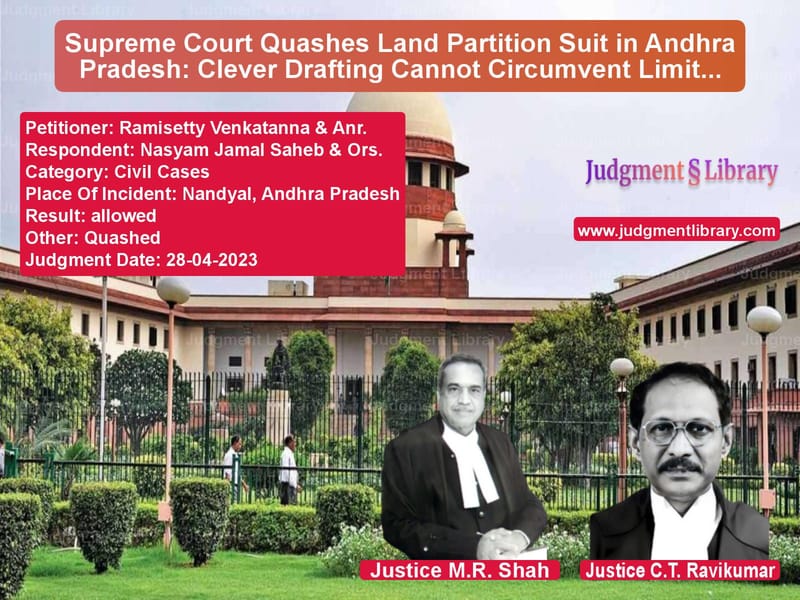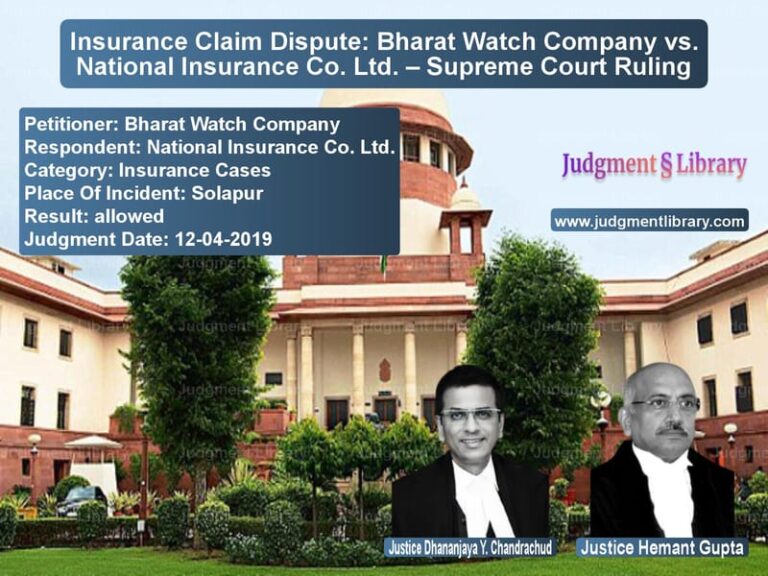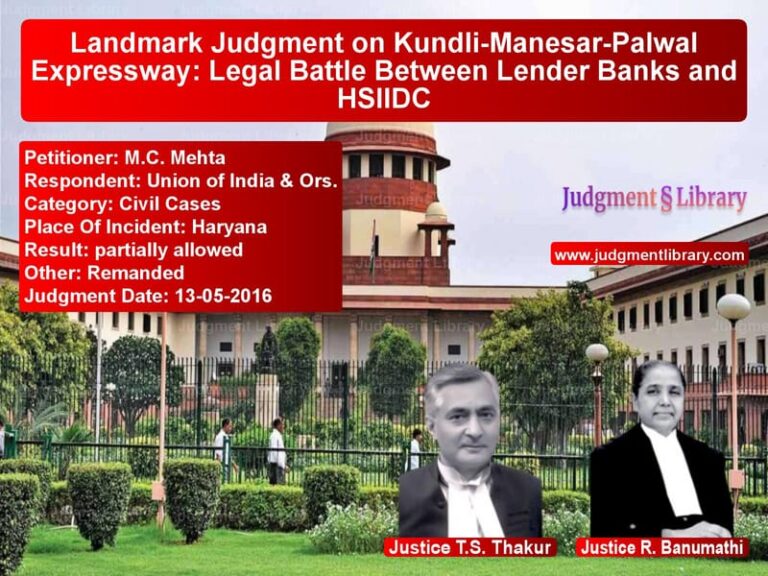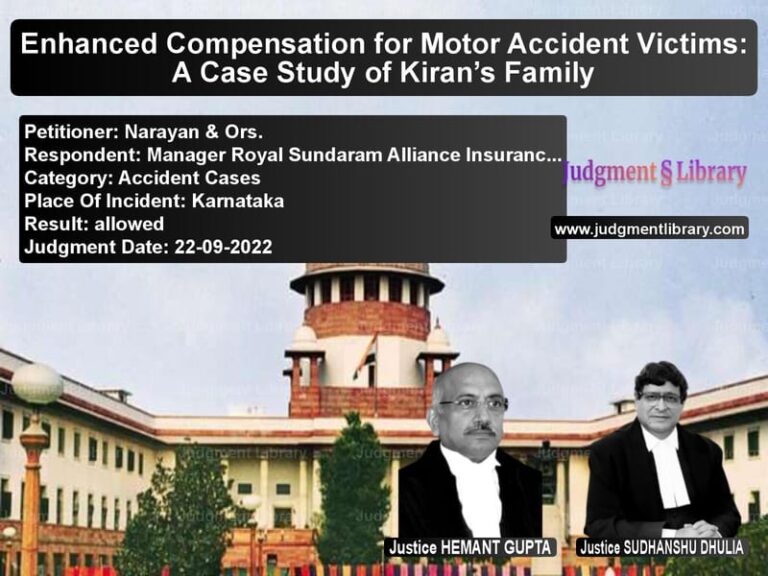Supreme Court Quashes Land Partition Suit in Andhra Pradesh: Clever Drafting Cannot Circumvent Limitation Law
The Supreme Court of India recently delivered a significant ruling in Ramisetty Venkatanna & Anr. v. Nasyam Jamal Saheb & Ors., quashing a long-standing land dispute in Andhra Pradesh. The Court held that the suit filed by the plaintiffs was barred by limitation and that the claim was an attempt to bypass legal provisions through clever drafting. The judgment reinforces the importance of limitation laws in property disputes and prevents misuse of the legal process.
Background of the Case
The dispute revolved around a piece of land located in Nandyal, Kurnool District, Andhra Pradesh. The original owner, Nasyam Jamal Saheb, had five children who partitioned his properties through a registered partition deed dated March 11, 1953. The petitioners, Ramisetty Venkatanna and another, acquired portions of the land through subsequent registered sale deeds in 2010.
The legal battle began when the descendants of Nasyam Jamal Saheb (plaintiffs) filed a suit in 2014, seeking declaration of ownership, cancellation of sale deeds executed in 2008 and 2010, and permanent injunction against the defendants. The plaintiffs claimed that there was an error in the 1953 partition deed, arguing that a wrongly mentioned survey number led to an incorrect division of land.
In response, the petitioners filed an application under Order VII Rule XI of the Civil Procedure Code (CPC), seeking rejection of the plaint on the grounds of limitation and lack of cause of action. The trial court dismissed this application, and the Andhra Pradesh High Court upheld the dismissal. Aggrieved by this, the petitioners approached the Supreme Court.
Petitioner’s Arguments (Ramisetty Venkatanna & Anr.)
- The suit was barred by limitation since it was filed 61 years after the partition deed was executed in 1953.
- The plaintiffs failed to challenge the partition deed, which was the basis of their claims, deliberately avoiding the statute of limitation.
- The suit was based on an alleged error in survey numbers, yet no rectification of the partition deed was sought.
- The claim was a clear misuse of legal provisions through clever drafting, an attempt to create an illusion of a cause of action.
- The trial court and High Court failed to appreciate that the plaintiffs had no legal right to challenge valid sale transactions executed by legal heirs.
Respondent’s Arguments (Nasyam Jamal Saheb & Ors.)
- The dispute was not about the validity of the 1953 partition but about an error in survey numbers affecting rightful ownership.
- The boundaries of the land should take precedence over survey numbers in determining ownership, as held in prior judgments.
- The trial court was correct in refusing to reject the plaint at the preliminary stage, as factual issues required full adjudication.
- Their claim was not time-barred since they were seeking a declaration of ownership rather than rectification of the partition deed.
Supreme Court’s Observations
- The Court held that the suit was barred by limitation, as it was filed six decades after the partition deed.
- The plaintiffs failed to challenge the 1953 partition deed, which formed the basis of their claims.
- The judgment relied on the T. Arivandandam v. T.V. Satyapal (1977) ruling, which held that courts should reject cleverly drafted suits that create an illusion of cause of action.
- The trial court and High Court erred in dismissing the petitioners’ request for rejection of the plaint.
- Legal heirs cannot disturb settled transactions by making belated claims without valid justification.
Key Judicial Findings
- The Court reiterated that limitation laws must be strictly enforced to prevent reopening settled transactions.
- A suit seeking ownership rights cannot be entertained if the foundational document is not challenged within limitation.
- The doctrine of clever drafting cannot override substantive legal provisions.
- The trial court and High Court failed to recognize the vexatious nature of the suit.
Final Judgment
The Supreme Court ruled in favor of the petitioners:
- The High Court and trial court orders were quashed.
- The plaintiffs’ suit was rejected under Order VII Rule XI for lack of cause of action and being barred by limitation.
- The Court emphasized that litigation designed to disturb settled transactions should not be entertained.
Implications of the Judgment
This ruling has far-reaching implications for land disputes and civil litigation:
- Strengthening Limitation Laws: The judgment prevents parties from challenging transactions after an unreasonable delay.
- Protection of Property Rights: Legal heirs cannot reopen property disputes decades after valid transactions.
- Prevention of Misuse of Law: Courts must reject suits that rely on technical loopholes or clever drafting.
- Judicial Efficiency: The ruling discourages frivolous litigation and ensures that courts focus on genuine disputes.
Conclusion
The Supreme Court’s decision in Ramisetty Venkatanna & Anr. v. Nasyam Jamal Saheb & Ors. reinforces the fundamental principle that limitation laws cannot be circumvented through legal manipulation. The ruling protects settled transactions from unwarranted challenges and ensures that legal disputes are resolved in a timely manner. By setting aside the High Court’s judgment and dismissing the suit, the Court has upheld the integrity of property laws and the rule of law.
Petitioner Name: Ramisetty Venkatanna & Anr..Respondent Name: Nasyam Jamal Saheb & Ors..Judgment By: Justice M.R. Shah, Justice C.T. Ravikumar.Place Of Incident: Nandyal, Andhra Pradesh.Judgment Date: 28-04-2023.
Don’t miss out on the full details! Download the complete judgment in PDF format below and gain valuable insights instantly!
Download Judgment: ramisetty-venkatanna-vs-nasyam-jamal-saheb-&-supreme-court-of-india-judgment-dated-28-04-2023.pdf
Directly Download Judgment: Directly download this Judgment
See all petitions in Property Disputes
See all petitions in Landlord-Tenant Disputes
See all petitions in Succession and Wills
See all petitions in Judgment by Mukeshkumar Rasikbhai Shah
See all petitions in Judgment by C.T. Ravikumar
See all petitions in allowed
See all petitions in Quashed
See all petitions in supreme court of India judgments April 2023
See all petitions in 2023 judgments
See all posts in Civil Cases Category
See all allowed petitions in Civil Cases Category
See all Dismissed petitions in Civil Cases Category
See all partially allowed petitions in Civil Cases Category







